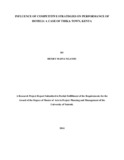| dc.description.abstract | The hotel industry in Kenya has in the past few years experienced a lot of changes and
growth which have affected the state of competition. This has demanded that the hotels
formulate and implement competitive strategies to be able to cope with competitive
pressure. The study sought to determine the competitive strategies employed by the
hotels in Thika town and the influence of the competitive strategies on the performance
of hotels. The study objectives include; to establish the influence of cost leadership,
differentiation and focus (cost leadership, differentiation) on performance of hotels in
Thika town. The beneficiaries of the findings of the study will include; the hotel owners
and managers in Thika town and other areas will understand, formulate and implement
the competitive strategies that will help improve their performance, the owners and
managers of other business enterprises, other players wishing to join the hotel industry
will have an understanding of the competitive strategies employed and therefore stand a
higher chance of success and students from institutions of higher learning will access
material for increasing their knowledge and undertake related studies. The study has
reviewed existing literature on the competitive strategies using the Igor Ansoff and
Michael Porter models and identified a knowledge gap to be addressed through a crosssectional
survey; targeting eating house hotels. This study was conducted using a
descriptive research design. An interviewer-administered questionnaire was piloted and
pretested after which it was administered to all participants on consenting to be part of
the research. A sample of 50 owners/managers of hotels was used with a target
population of 150 persons. Quantitative data was coded and entered into Statistical
Packages for Social Scientists (SPSS Version 17.0) and analyzed using descriptive
statistics. The finding was presented inform of frequency tables and explanations were
presented in prose. In addition, the researcher conducted a Karl Pearson’s Product
moment correlation coefficient to ascertain whether a statistical significant relationship
exists between the independent variables and the dependent variable. The study
established that differentiation strategies had the strongest influence on performance with
a correlation coefficient of 0.933. Cost leadership strategies also had significant influence
on performance with correlation coefficients of 0.897. Focus (cost leadership,
differentiation) strategies also had significant influence on performance with correlation
coefficients of 0.883. Meaning the findings of the study indicated that the strategy with
the strongest influence on performance of hotels is differentiation strategy. | en_US |

